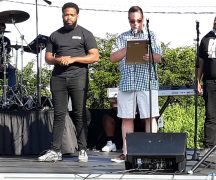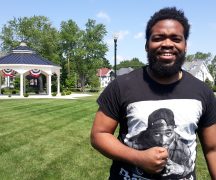By JAN LARSON McLAUGHLIN
BG Independent News
Sixty-five years ago Friday, Emmett Till was murdered at age 14 after innocently flirting with a white woman in a small Mississippi town’s grocery.
His murder and his mother’s refusal to mourn quietly helped propel the start of the civil rights movement.
In Bowling Green, members of BRAVE (Black Rights, Activism, Visibility and Equity) want the 65th anniversary of Emmett’s murder to be remembered.
“We just think the country needs to commemorate his life,” said Anthony King, of BRAVE. “He’s important to Black people in the community, so it should be important to the Bowling Green community.”
Earlier that summer of 1955, Emmett, from Chicago, begged his mother to let him travel with his great uncle to visit family in Mississippi.
Three days after arriving in Money, Mississippi, Emmett and other teenagers headed to Bryant’s Grocery and Meat Market after the others had a long day picking cotton in the hot afternoon sun.
The stories vary of what happened next. In some versions, as Emmett left the grocery, he whistled at Carolyn Bryant, the white clerk who was the wife of the store owner. In other versions, Emmett, who was not accustomed to the extreme segregation in the south, bragged that his girlfriend back home was white. Emmett’s African American companions dared him to ask the white woman sitting behind the store counter for a date. He went in, bought some candy, and on the way out was heard saying, “Bye, baby” to the woman.
Bryant later wrongly accused Emmett of touching her hand, grabbing her by the waist and making sexual advances towards her.
Days later, around 2:30 a.m., Roy Bryant, Carolyn’s husband, J.W. Milam and others kidnapped Emmett from his great uncle’s home. They drove to a barn, where they brutally beat Emmett, dragged his body to the bank of the Tallahatchie River, shot him in the head, tied him with barbed wire to a large metal cotton gin fan and shoved his mutilated body into the water.
Emmett’s body was shipped to Chicago, where his mother defied Mississippi authorities’ orders to leave the box his corpse was in closed and locked. She decided to have an open-casket funeral with Emmett’s body on display for five days. Thousands of people came to see the evidence of the brutal hate crime.
The trial against Emmett Till’s killers began on Sept. 19, 1955. Because blacks and women were barred from serving jury duty, Bryant and Milam were tried before an all-white, all-male jury. Emmett’s great uncle took the stand and identified Bryant and Milam as Emmett’s kidnappers and killers.
Four days later, the panel of white male jurors acquitted Bryant and Milam of all charges. The jury’s deliberations lasted 67 minutes.
Four months later, Bryant and Milam admitted to Emmett’s murder. Protected by double jeopardy laws, they confessed how they kidnapped and killed Emmett to Look magazine for $4,000.
While the men escaped justice, many saw Emmett’s murder as helping to galvanize the start of the civil rights movement in the U.S.
“This is one of the big moments in our history of Black rights,” King said.
The fears and struggles faced by Black Americans in 1955, in some ways, remain today.
“Emmett Till did not deserve to die, just like Black people don’t deserve the pressure we feel today,” King said.
And while many White people believe racism no longer exists in the U.S., King doesn’t have to look far to find examples.
“The system of America was not built to protect young Black men,” he said.
“People think these things happened 50 years ago in another part of the country,” King said. But they aren’t over, and they aren’t just in the south.
In 1955, it was Emmett Till. In 2020, it was George Floyd.
“They really reignited the fire of social justice,” King said.
“People of color are oppressed in this country,” he said. Those feelings have increased throughout Donald Trump’s presidency.
“Racists feel empowered to come out now,” King said.
That makes the commemoration of Emmett Till’s life even more important, he said.
Keisha Merriweather, a member of BRAVE, said she has lived in Bowling Green for the past four years.
“I haven’t felt that safe being here,” she said.
The memorial to Till is important to her.
“We can openly voice our opinions,” Merriweather said.
BRAVE’s remembrance will be a virtual Zoom event on Friday starting at 7:30 p.m.
The event will focus on Emmett and his mother, who reluctantly became a strong advocate for civil rights. There will be guest speakers, who will share their experiences, education about Emmett and his murder, action steps for the community, and time for comments and questions.
Details of the Zoom event will be posted on https://www.facebook.com/bgbrave. Those interested may also view it on BRAVE’s Instagram Live.
Friday’s event will be the first in a local series of programs on milestones in the Civil Rights movement, “so African Americans feel they are represented here,” King said.





